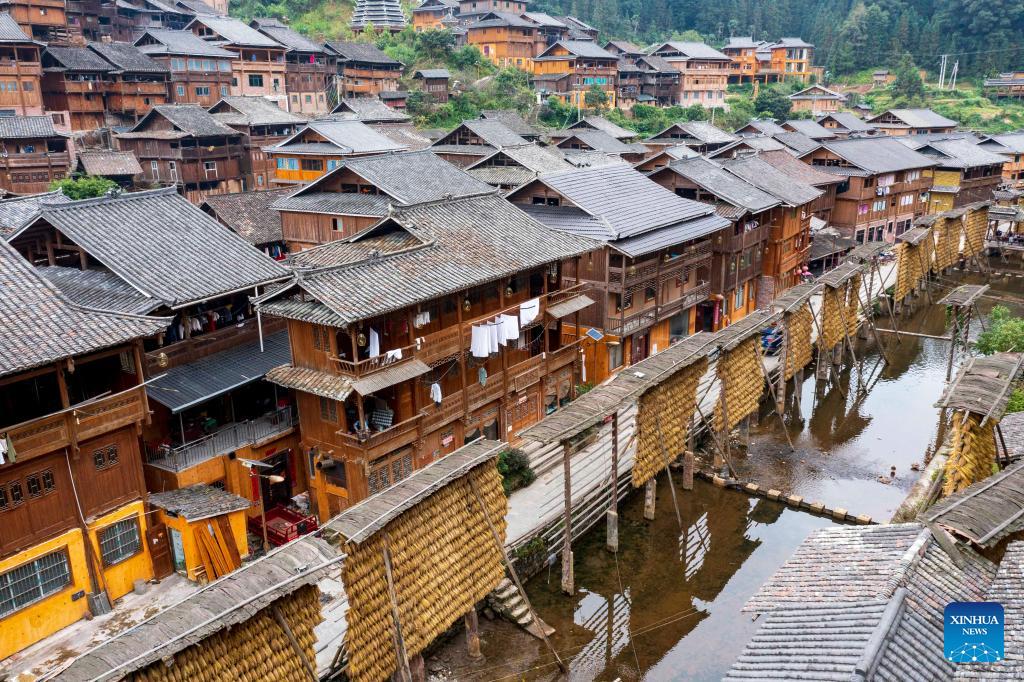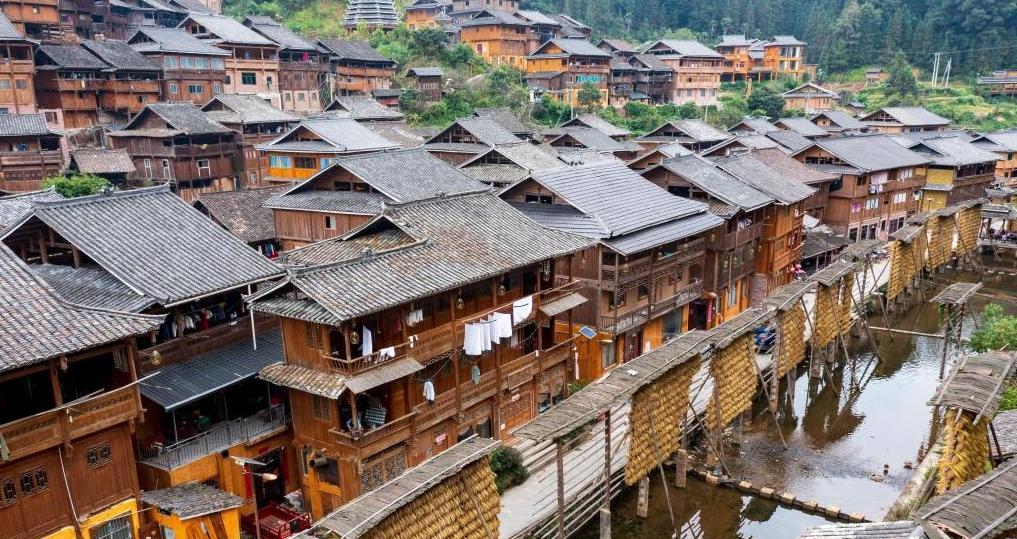Millennium-old agricultural legacy flourishes in southwest China
Xinhua, November 25, 2024 Adjust font size:
An aerial photo taken on Oct. 21, 2024 shows a view of Zhanli Village, Congjiang County, southwest China's Guizhou Province. (Photo by Wu Dejun/Xinhua)
For more than 1,400 years, an ethnic minority in Congjiang County, southwest China's Guizhou Province, has been inheriting a traditional agricultural practice, cultivating rice in terraced fields while raising fish and ducks among these plants.
Zhanli Village, surrounded by lush mountains, is home to more than 800 ethnic Dong residents comprising 190 households, and is one of the primary areas in Congjiang where this traditional farming method is promoted.
With limited arable land resources, the villagers have adapted to local conditions, developing a unique farming approach that has been passed down for generations.
Locals typically sow rice seeds during the Grain Rain period, the sixth of the 24 solar terms in the traditional Chinese lunar calendar, as temperatures rise. Once the seedlings start growing, they are transplanted into the paddy fields along with fish fry. When the fish reach two to three fingers wide, ducklings are introduced into the fields.
Wu Guoping, an expert from the county's agriculture and rural affairs bureau, explained that the Dong people have lived in harmony with the seasons by adapting to the growth characteristics of different species, thereby saving land resources and enhancing the efficiency of agricultural production.
The paddy fields provide both a habitat and food for fish and ducks, while in return, the fish and ducks aerate the soil, and eliminate pests and weeds, while their droppings serve as nutrients for the rice, thereby achieving a symbiotic relationship, Wu added.
In 2011, the Congjiang Dong Rice-Fish-Duck system was recognized by the Food and Agriculture Organization of the United Nations as one of the Globally Important Agricultural Heritage Systems. In 2013, it was listed among the first batch of China's important agricultural heritages.
Embracing its distinct indigenous ecology and culture, Zhanli has also blossomed into a thriving tourist destination.
With autumnal hues of golden rice ears adorning paddy fields, Zhanli Village draws many visitors from around the globe to marvel at its idyllic vistas of terraced fields and ears of rice hanging on wooden drying racks.
Mieke Gorter, a tourist from the Netherlands, has been frequenting Guizhou since the 1990s. Captivated by the province's breathtaking landscapes, warm-hearted ethnic communities, and the richness of their cultural heritages, she sometimes even manages to visit Guizhou two or three times a year.
Gorter said that this was her second visit to Zhanli Village, and she was deeply impressed by the local agricultural wisdom. She was delighted to see that China's traditional farming methods have been preserved for thousands of years -- aiding in the coordinated development of production, daily living and environmental protection.
Despite the language barrier, she still felt the warmth and friendliness of the locals, and noticed that the village had become cleaner compared to her last visit.
The village's development has also convinced some migrant workers to return home.
Wu Chunguang, a 37-year-old Dong man and former truck driver, saw the increasing number of tourists in his hometown and decided to go back to Zhanli in 2017. He transformed and upgraded his home and now uses part of it as a restaurant.
Currently, Wu earns nearly 100,000 yuan (about 13,890 U.S. dollars) annually and finds it more convenient to care for the elderly and children in his family. During this year's week-long National Day holiday, his restaurant received over 20 tables of tourists from inside and outside the province in a single day, with agricultural products such as glutinous rice and Congjiang fish being in high demand and selling out quickly.
Wu Guoping said that in recent years, Congjiang has been promoting the protection of local germplasm resources, registering trademarks for Congjiang glutinous rice and fish, and defining protected areas to develop the rice-fish-duck industry.
"This effort not only enhances the added value of the products, but also broadens the wealth-building path of the villagers while preserving traditional agricultural culture," he added. ■

